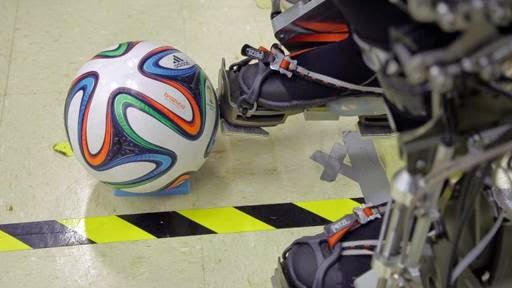Yahoo – AFP,
Rosa Sulleiro, 9 June 2014
 |
Undated
handout picture showing a Brazuca football beside an exoskeleton
at Brazilian
scientist Miguel Nicolelis' lab in Sao Paulo, Brazil
|
The first
kick at the World Cup opening ceremony will be made by a paraplegic wearing an
Iron Man-like robotic bodysuit controlled by signals from the brain.
Brazilian
doctor Miguel Nicolelis led a team of 156 scientists from around the world to
create the futuristic exoskeleton, which was designed to enable paralysis
victims to walk.
At the
World Cup opening ceremony Thursday in Sao Paulo, a paraplegic whose identity
has been kept secret will leave behind his or her wheelchair to take to the
pitch in the suit and give the tournament's first kick.
 |
Undated
handout picture showing scientists
at work at Brazilian scientist Miguel
Nicolelis'
lab in Sao Paulo, Brazil.
|
Electronic
circuits in the device's "feet" will send a return signal to the user
via an artificial skin worn on the arm, conveying the sensation of movement and
contact.
"It's
the first time an exoskeleton has been controlled by brain activity and offered
feedback to the patients," Nicolelis, a neuroscientist at Duke University,
told AFP.
"Doing
a demonstration in a stadium is something very much outside our routine in
robotics. It's never been done before."
His voice
contains a mix of exhaustion and excitement, the result of 30 years' work, more
than 200 scientific papers and countless clinical tests that are nearing a
spectacular summit.
Nicolelis
started down this path in 1984 when he wrote his doctoral thesis on neural
connections in muscular control.
He said the
idea for the suit came to him in 2002, when scientists were just beginning to
explore robotic exoskeletons.
"In
2009, after we learned Brazil was hosting the World Cup, they asked me for
ideas to show Brazil in a different way than the world usually sees it. That's
when I suggested doing a scientific demonstration to teach people that Brazil
is investing and has human potential to do things beyond football," he
said.
 |
Undated
handout picture showing
Brazilian scientist Miguel Nicolelis at
his lab in Sao
Paulo, Brazil.
|
Nicolelis
said he and a team of some 40 people have barely left the lab since March, when
they arrived in Sao Paulo, Brazil's largest city and economic hub, to finalize
preparations.
But it's
been rewarding, too, he said, recalling the moment on April 24 when a paralyzed
user first took steps in the exoskeleton.
They named
the device the BRA-Santos Dumont, a combination of the three-letter sporting
code for Brazil and Alberto Santos-Dumont, a Brazilian aviator, inventor and
bon vivant who once demonstrated controllable flight was possible by flying his
dirigible around the Eiffel Tower.
Scientific controversy
Some
scientists have criticized Nicolelis for ditching academic publications in
favor of mass media -- he posts research updates on Facebook -- and the
anonymity of the lab for the lights of the World Cup stage.
 |
Undated
handout picture showing a
paraplegic patient (L) wearing an interface
helmet
being prepared for a test at
Brazilian scientist Miguel Nicolelis' lab
in Sao
Paulo,Brazil.
|
Critics
have also questioned the practicality of his research and accused him of
hogging an unfair share of the Brazilian government's research budget.
Nicolelis rejects that criticism.
"The
funding is the same with or without the World Cup. We've received $14 million
from the Brazilian government over the last two years. That's approximately
four or five times less than what the United States government invests in a
mechanical arm," he said.
"I
don't see anything wrong with demonstrating a technology for the whole world
that has a humanitarian objective and was paid for by civil society," he
added.
More than
65,000 people will be in Sao Paulo's Corinthians Arena to watch the BRA-Santos
Dumont's first steps in public before Brazil play Croatia in the opening match.
Around a billion are expected to watch on TV.


No comments:
Post a Comment